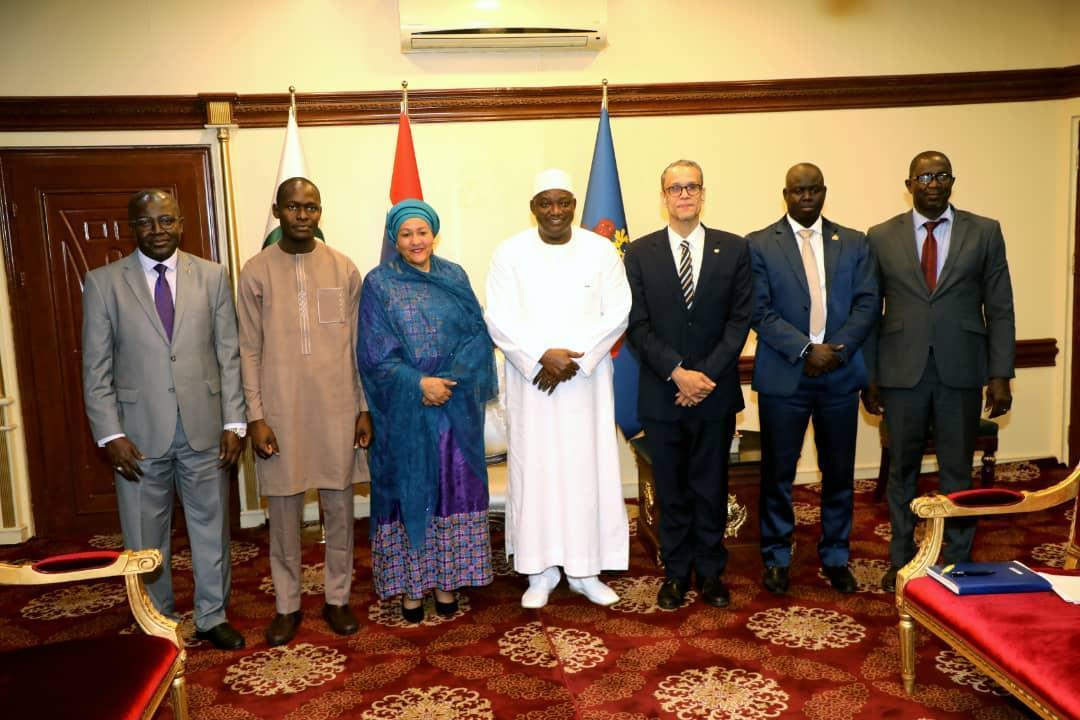Africa-Press – Gambia. The Deputy Secretary General of United Nations (DSG UN), H.E. Amina J. Mohammed on Monday met President Adama Barrow at State House in Banjul as part of her working visit into the Gambia.
Mrs. Mohammed discussed economic development and how the UN could mobilise resources to support the country’s efforts towards sustainable economic growth and Transitional Justice.
Deputy UN SG Mohammed commended President Barrow for his leadership of the OIC and his stance on justice for women and young people. “Empowering them with education, culture and faith, the young people would be on the right track to build Africa,” she remarked while expressing appreciation over President Barrow’s approach to negotiation, democracy, and governance.
Madame Mohammed also called on the sub regional bloc Economic Community Of West African States (ECOWAS) to continue working towards transitional peace and stability. Africa, she says, needs to focus and modernise its best practices to meet the needs of its populations.
For his part, President Barrow expressed appreciation for such a high-level visit and conveyed his sincere gratitude to the UN Secretary General, Antonio Guterres, for the support The Gambia continues to receive since 2017. He added that the UN Peace building Fund, among other UN programmes support the Government’s reform programme, including Transitional Justice and the Security Sector Reform.
President Barrow and the visiting DSG Mohammed also discussed multilateral, regional and national issues affecting The Gambia such as governance, Domestic Resource Mobilisation (DRM) and reforms at the UN. The President elaborated on the positive impacts of digitalisation in DRM geared towards social projects that enhanced the livelihood of citizens. He reveals that his government is determined to widen the tax sources rather than increase taxes, which impacts on the cost of living.
Despite the challenges of being a developing country, President Barrow acknowledged the great strides in The Gambia’s democracy, education and skills development for the youth and women for improved livelihoods. He stated his government’s efforts to make education and skills development accessible to build the capacity of young people in creating jobs and providing services.
On gender equality, the President highlighted the progress in the judiciary, health and education sectors while reflecting on the socio-cultural barriers to advancing women in political leadership and governance. “Considering the immense contributions of women in building household and food security, there must be approaches for the gradual transition of women economic growth from informal entrepreneur to formal sector operators,” President Barrow said.
Beyond The Gambia’s borders, President Barrow called for dialogue, review of the decision-making processes and reforms of ECOWAS, AU and the UN for a fairer and just global order for sustainable peace and security in conflict and war zones. “In a world order of donor fatigue, progressive international norms and values should be the focus for sustainability. Africa must redirect its resources and think Africa for sustainable development,” President Barrow asserted while encouraging dignity and hard work.
The Gambia as a model for other countries has been earmarked for its potential in the blue economy, food security, justice and economic development.
For More News And Analysis About Gambia Follow Africa-Press






